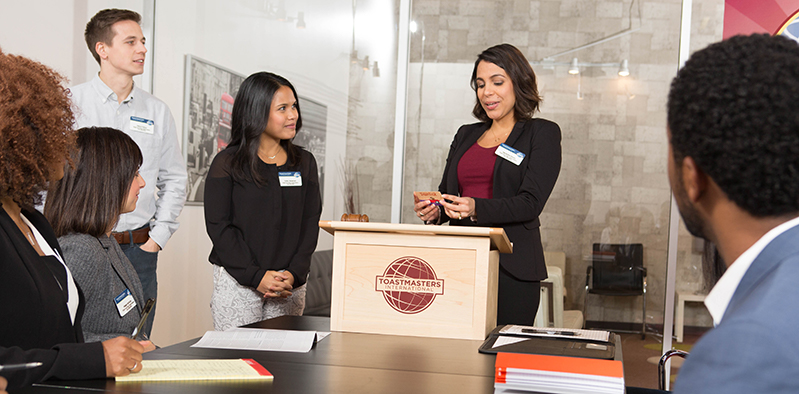
If I were to ask you what the purpose of Table Topics is, I suspect you would say, “To teach us how to speak when unprepared.” While that is true, another reason is equally important.
I was taught one basic principle when I joined Toastmasters: that everyone should have an opportunity to speak at a club meeting. That gives the Table Topicsmaster a second purpose—one that governs much of how to handle that role—to give more members a chance to speak.
Perhaps no role at Toastmasters meetings offers more flexibility than that of Table Topicsmaster. The purpose of Table Topics can be achieved in many different ways. Even so, the following techniques can help, no matter which path you choose to follow.
Your first task as Table Topicsmaster is to come up with a list of questions. You may ask, “How many questions should I prepare?” Every club is different. If you aren’t sure how many members usually speak during Table Topics, ask a more experienced member. That number represents the minimum number of questions you should create. I always write four or five more than I need. That way I am prepared for surprises. And if your club has a meeting theme, be sure to tie into it.
The nature of your questions is also important. The first club I joined liked having really tough, off-the-wall questions. Questions like, “If you met a space alien, …” I liked that because I am a creative person. And, as such, those were the types of questions that I wrote. I noticed something, though. The speakers weren’t answering the questions but instead changed the topic to speak about something else.
That is when I changed my thinking. If my job is to help people speak on their feet, then I need to make that task easy. My questions now are very simple, and they allow speakers to focus on crafting a response and speaking smoothly. Alternatively, your club may like the more difficult questions. If your members embrace them and answer them, then that’s great. If they keep changing the topic, you might want to rethink that practice.
The Table Topicsmaster role is not about giving you an opportunity to speak; it is about you giving others the opportunity to speak.
Once I have my questions, I prioritize them. Some are better than others. Those are the ones I want to ask first. The others are my overflow. That is your pre-meeting preparation. But now the meeting day has arrived and the president has called the meeting to order. You have one more task to perform before the Table Topics segment begins: It’s time to make a list of all of those attending the meeting.
I make four columns. Column 1 includes all who have no role that day. These are the members I call on first. Column 2 includes everyone with a minor role, such as Ah-Counter, grammarian and timer. Column 3 is for those with a major role to play: Toastmaster, speaker, General Evaluator and Speech Evaluator. Column 4 is for guests, if you have any. Your club has a protocol on how to handle those visitors. If you don’t know your club’s protocol, check with one of your mentors prior to the meeting.
Next, I decide in which order to call on the members and I number them accordingly. I exhaust all members in Column 1 before proceeding to Column 2. I resist the temptation to call on the best Table Topics speakers first. “Oh, I want to hear Mary speak. She’s good!” The problem is that Mary doesn’t need practice as much as some other club members. Call on Mary, yes, but only after the less proficient members have had a chance to speak.
You can weave any guests into the column 1 group, but don’t call on a guest to speak first or second. Give them an opportunity to see how it is done before inviting them to participate.
One last thought. The Table Topicsmaster role is not about giving you an opportunity to speak; it is about you giving others the opportunity to speak. Get to the next question quickly to enable more members to speak. And keep an eye on your Toastmaster who will give you the signal to wrap it up.
Table Topicsmaster is an important role. It helps make the Toastmasters experience that much more valuable for every member—including those without a meeting role.
Bill Brown, DTM is a speech delivery coach in Gillette, Wyoming. He is a member of Energy Capital Toastmasters in Gillette. Learn more at billbrownspeechcoach.com.



 Previous
Previous
 Previous Article
Previous Article